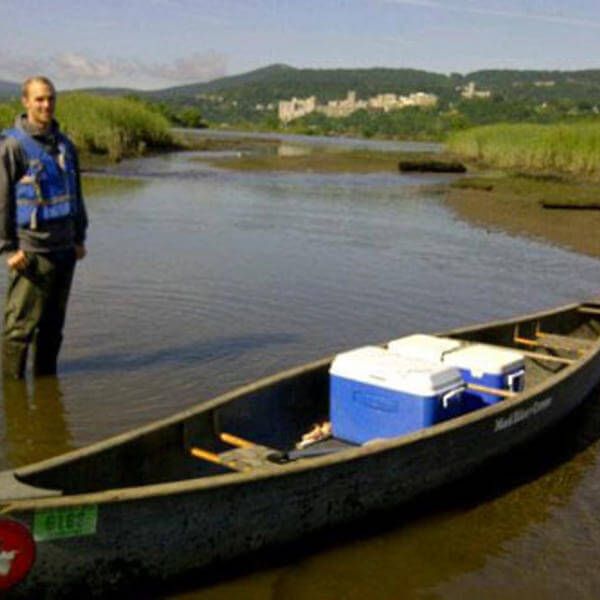Craig Connolly, a member of the class of 2013 at the College of the Holy Cross, is no stranger to scientific research, but after working with the Hudson River Foundation in New York this past summer, he gained a new perspective of the environment. A biology major, with an environmental studies concentration, Connolly recently received a Tibor T. Polgar Fellowship, an award that allowed him to both travel to and study the iconic Hudson River this summer. Connolly investigated the change in sea level rise in the river in order to better understand the impacts of global warming, salinity, and climate change.
Last year, Connolly worked through the College’s study abroad office, to team up with the Center for Marine and Resource Management Studies in tropical Turks and Caicos. While conducting a project about sea grass community dynamics, he kept in touch with William Sobczak, associate professor of biology and the director of environmental studies at Holy Cross, who recommended that Connolly look into the Polgar Fellowship opportunity. “Fellowships allow students to apply what they’ve learned at the college to problems in the world,” says Sobczak. Expressing confidence in Connolly’s work in the field, Sobczak continues, saying, “He has done a remarkable job by contributing to the community as a scientist and as serving as a diplomat for the College.”
Founded in 1985, the Polgar Fellowship has provided $1 million in funding to undergraduate and graduate students with an interest in studying the environment. Since the fellowship allowed Connolly to reside at the Cary Institute of Ecosystem Studies, a national leader in environmental research, he quickly became immersed in the world of ecology. “I was able to work with a lot of people,” says Connolly. “It was great to meet so many scientists and experts in the field.”
While examining the nature of the Hudson River wetlands, Connolly realized that his work as a young scientist was crucial, as well as rewarding. “There’s a certain thrill to researching a question,” he explains, “like how does climate change affect the ecosystem?”
“And then there’s the thrill of discovery,” he continues. “It’s important to create new knowledge for the restoration of wetlands, or for the importance of climate change.”
When he is not conducting research, Connolly is active in cocurricular activities on campus. He is a teaching assistant for Sobczak’s “Freshwater Ecology” class, plays on an ultimate frisbee team, and until this year, has played violin in the College’s chamber orchestra. It is science, however, that inspires him most, as he plans to obtain a Ph.D., so that he can eventually become a teacher and continue to research climate change and marine biology.
Reflecting on his experience on the Hudson River, Connolly considers himself lucky. “It was an extremely rewarding summer,” he says. “It was a privilege to have worked hard in classes and then been able to connect what I’ve learned to my research.”
Stuart Findlay, the leading scientist at the Cary Institute, will be giving a talk on campus titled “Hudson River Tidal Freshwater Wetlands: the Functions and the Future” on Tuesday, Oct. 23 at 12:30 p.m. in O’Neil 112.
Holy Cross Biology Major Studies Climate Change on the Hudson River

Read Time
2 Minutes

